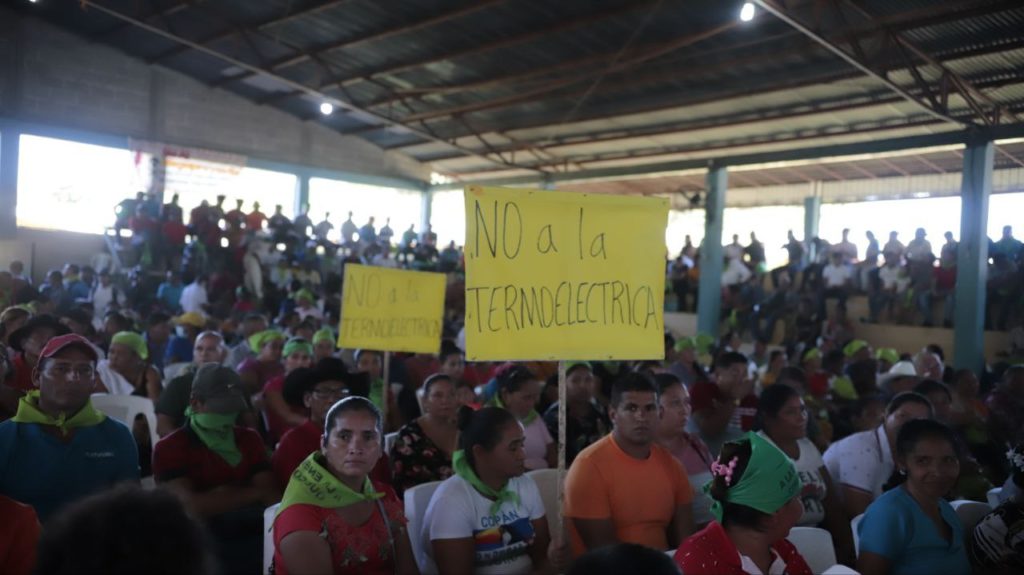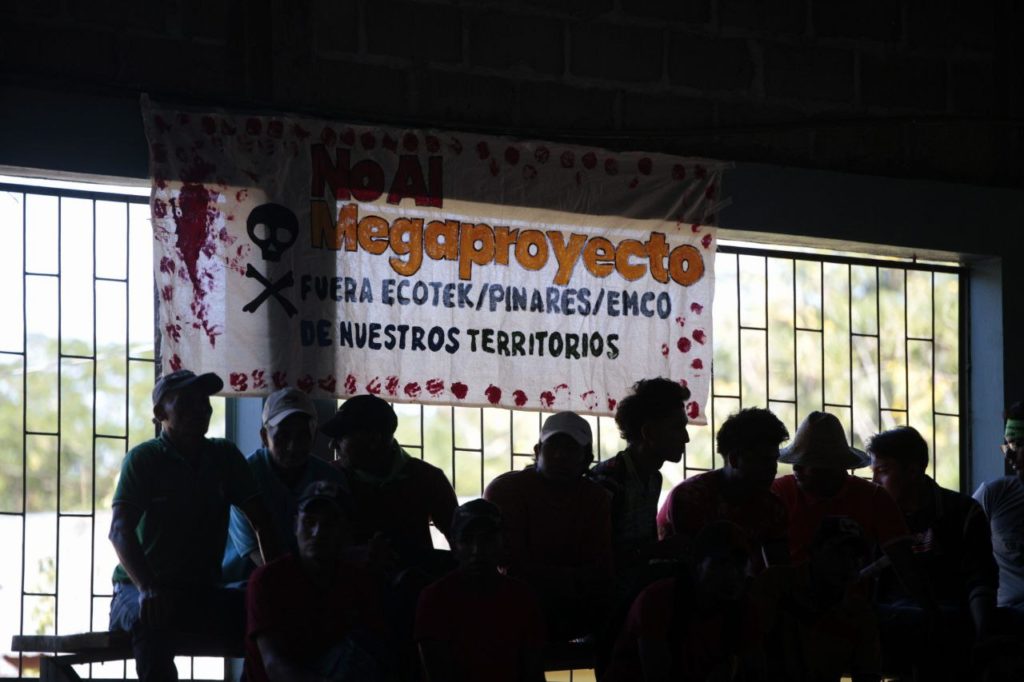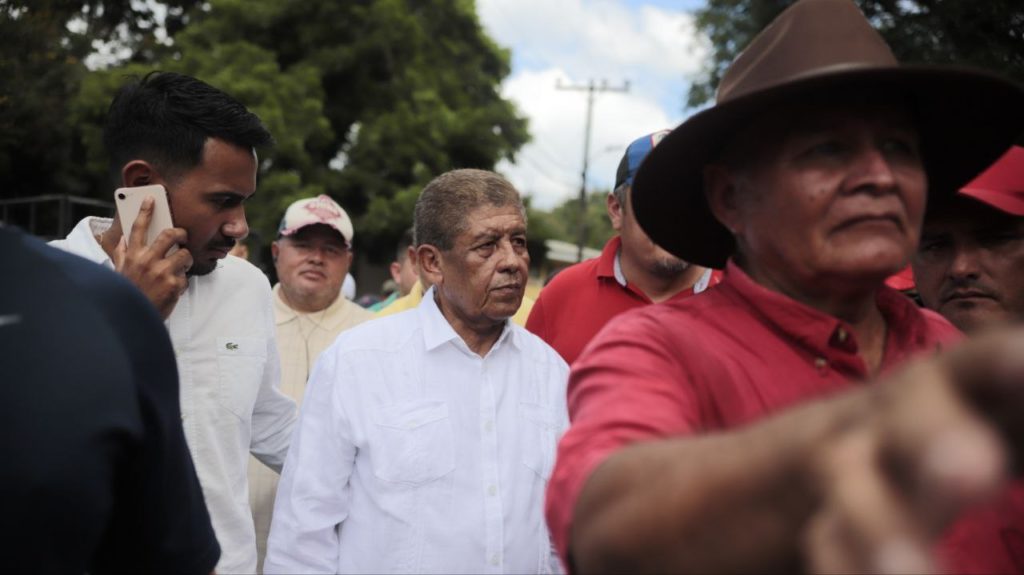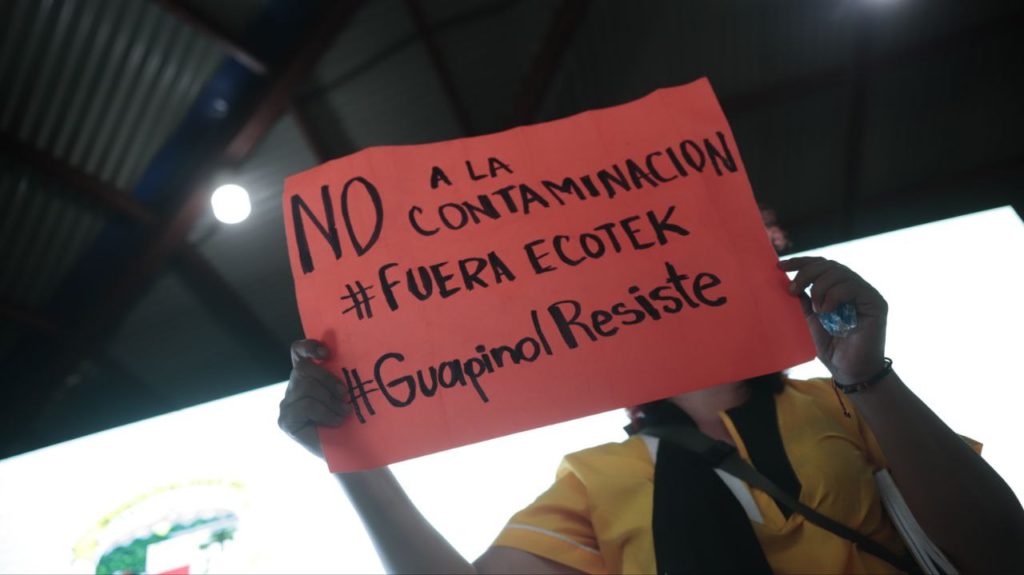After the cancellation of the town hall meeting meant to be held on Saturday, December 9 by the mayor of Tocoa, Adán Fúnez, hundreds of representatives across the municipalities and several organizations opposed to the project organized a popular assembly, in which they officially ratified their rejection of the Ecotek power plant and pointed to it as an attempt by the EMCO Group to continue with the installation and operation of the mine in the Carlos Escaleras National Park, with the intention of using petcoke, a highly polluting petroleum derivative. The power plant is part of the conglomerate headed by Lenir Pérez, a Honduran businessman under investigation by the FBI in the United States.
Text: Fernando Silva
Photography: Fernando Destephen
Translated by: Amy Patricia Morales
Nearly 2,000 people, representatives of diverse communities in the municipality of Tocoa, Colón, accompanied by members of organizations and international cooperation, filled the auditorium of the Froylán Turcios Institute to demonstrate their solidarity against the energy generation project of the Ecotek Plant, of the EMCO Group.
Also in attendance were people in favor of the project, most of whom arrived in buses paid for by the company, having been promised breakfast and lunch.
These groups responded to the call from Mayor Adán Fúnez, who in meetings of the municipal corporation had promoted the creation of the council, announcing it directly as a “council for socialization and approval,” without giving the option of consultation that would lead to the rejection of the project.
Environmental organizations and local residents point to ongoing human rights violations associated with businessman Lenir Pérez’s investments in the country as grounds for their opposition to the project. For example, the legal persecution faced by opponents to the project and, specifically in this instance, the plant’s proposal to utilize petcoke for energy generation. Petcoke, according to the Center for the Study of Democracy (Cespad) is one of the most environmentally harmful and carbon-intensive electricity generators.
The meeting was scheduled to begin at 9:00 a.m.; however, Funez arrived alongside his security detail and the governor of the department, Ixcer Barahona, more than two hours later, speaking on the phone. Sensing the crowd’s pressure and listening to his advisors, instead of entering the hall, Funez left and cancelled the meeting.
Significant investments were made to seek approval for the project. A giant screen was set up, and individuals were provided with transportation and meals to attend and support the company, as revealed by the people arriving. Furthermore, the company distributed hundreds of informative pamphlets.
The last town hall meeting convened to make decisions regarding extractivism in the municipality dates back to November 2019, when Adán Fúnez, accompanied by the current presidential advisor and general coordinator of Libre, Manuel Zelaya, faced a hostile reception as they were booed by the attendees. Despite the attendees’ vote declaring the municipality free of mining, mine operations continued.
The Ecotek power plant belongs to the business group headed by Lenir Perez, who also owns the controversial Palmerola International Airport concession, and whose house in Wellington, Florida, US, was inspected by the FBI in April 2023. Funez has also been mentioned in trials in the United States for his relationship with Honduran drug traffickers.
The Tocoa municipality and the Ecotek company, part of the EMCO group, are currently under investigation by the Special Prosecutor’s Office for Transparency and Combating Public Corruption (FETCCOP) for the alleged adulteration of a municipal town hall meeting minutes, in order to comply with the project’s socialization requirement.
On this occasion, without the backing of the top leader of his party, Fúnez was weak, and his attempt to approve the project was reversed in the popular assembly, in which the communities ratified their rejection of the projects promoted by Grupo Emco’s companies.
A town hall tailored to meet the company’s needs
The first incident in the breakdown of the town hall meeting took place at 7:40 a.m., when members of the National Police identified and removed from the Froylán Turcios Institute people singled out by the environmental organizations as security guards of the Ecotek company.
The organizations denounced early in the morning that the company’s security had entered the educational center where the meeting was held the night before, and that during the course of the morning, luxury cars carrying supposed observers of the process entered through an alternate access gate.
A few minutes after the police removed these people, several busloads of people arrived claiming to be residents of the community of Ceibita, one of the zones of influence of EMCO’s mining megaproject. Most were women and children who arrived disoriented, following the leaders of the local patronatos who received multiple promises from the company to bring them health, education and development.
Opponents of Grupo EMCO’s projects call these people “the miners” because of their support for the installation of the mega-mining complex in Carlos Escaleras National Park. The “miners” wore blue paper bracelets like those used at hotels and parties. This identification, in addition to receiving breakfast and lunch paid for by the company, was a silent sign of their loyalty to the interests of the mining and energy generation project.
Among these people, Gilberto Morales, president of the Ceibita board of trustees, explained that “we come in support of the Ecotek electric energy company, because of the blackouts we have all the time, and since this company is here we want to support the development of the village and communities. I don’t know how many megawatts would be for the municipality of Tocoa, but I know that a certain amount will be distributed; besides, the company has promised us infrastructure, health, education and environment”.

In June 2023, Lucky Medina, head of the Secretary of Natural Resources and Environment (Serna) announced that the operations of the mining complex installed in Carlos Escaleras National Park would be suspended due to their lack of environmental licenses; however, according to activists, the halt of the mining complex’s operations has been based more on discourse than reality, since there is no official press release from Serna declaring the suspension.
“I don’t know anything about the contamination, but we have met with the company and with everything they say, we think it will be fine (…). Today the bus comes paid for by the company, they are also going to give us food,” Gilberto Morales finally explained.
In January 2022, the National Congress halted a project linked to Lenir Perez’s companies and the generation of energy through petcoke. The project sought to approve a priority contract for Puente Alto Energy of the Emco Group, but was objected to by the Honduran Council of Private Enterprise (Cohep) and the Honduran Association of Electric Energy Producers (AHPEE), who pointed out risks of unfair competition. In addition, José Morán, then head of the Electricity Regulatory Commission (CREE), highlighted across social networks the importance of rigorous processes to protect the environment and health.
Division and tension in the town hall meeting
Following the first occurrences of the day, the gates opened at 9 a.m., and opponents of the project, including environmentalists and members of organizations, filled the auditorium of the Froylán Turcios Institute. There they waited for two hours, amidst popular slogans and the heat of the Honduran coast, for the arrival of Mayor Adán Fúnez.
While they waited, people who identified themselves as “veedores” handed out brochures with information in favor of the power plant and about the supposed benefits that the project would bring to the communities; the attendees responded by breaking and burning the brochures. Organizational representatives denounced the presence of members of the company’s private security at the event at that time.
In relation to the information provided to communities to be able to make a decision on the project during the town hall meeting, the Center for the Study of Democracy (Cespad) emphasized in a report that “there has not been adequate time for the information to reach all the affected communities”.
In this regard, Leonel George, environmentalist and councilor of the municipality, said that “it is abuse and an arbitrary act. These are signs of illegality and we believe that the people are coming to decide; it is not enough time to tell them that we are socializing a project that has enormous environmental and health impacts on the communities.”
On the other hand, the councilman of the Partido Salvador de Honduras (PSH), José Estrada, pointed out that as a municipal corporation they had the expectation that the people of the municipality would decide whether to approve or reject the project; however, he pointed out that “they are not fools”; they know that the company seeks its own benefit and the energy problems of the municipality will not be solved with the installation of the project.

The flight of the local leader
Although people were awaiting his arrival to commence the meeting, Fúnez never entered the auditorium. After a few minutes and a long phone call, the mayor decided to leave upon arriving at the gate, followed by the people from the communities that the company had brought to the event, and postponed the meeting.
Unlike the town hall convened in November 2019 to determine the potential declaration of Tocoa as a mining-free municipality, Fúnez arrived without his key ally, crucial for sustaining his influence in the area: Manuel Zelaya, coordinator of the Libre Party. At the time, Zelaya had said in national media that the concession granted to Grupo EMCO “destroys nature, destroys water sources (…) that concession is a crime against nature in the municipality of Tocoa”.
Contradicting these statements, Adán Fúnez’s backing of Grupo EMCO has been clearly demonstrated and denounced by human rights organizations and members of the Partido Libre. Despite this, Zelaya has consistently expressed strong support for the mayor of Tocoa. Even at the outset of Xiomara Castro’s administration, Fúnez was appointed as the governor of the department of Colón, a move that faced significant scrutiny. Ultimately, Fúnez designated Ixcer Barahona, one of his trusted employees from the municipality, to the position.
After Fúnez’s departure from the event on Saturday, December 9, six of the municipality’s ten councilors decided to continue the meeting. Thus, local organizations and residents that attended the meeting initiated a popular assembly in which they officially rejected the installation of the thermoelectric energy project.

On behalf of the central government, the event was accompanied by the Vice-Minister of the Human Rights Secretariat, Guido Eguigure, who expressed his concern for the safety of environmental and human rights leaders who have received threats previously from people in favor of the company. Now, after the failure of the town hall meeting called by the municipality, there could be an escalation of violence against activists.
Eguigure also addressed the accusations against Lucky Medina, the owner of La Serna, for endorsing the project led by businessman Lenir Pérez. He stated, “I recognize that the activists are denouncing La Serna for supporting this initiative; I am not entirely sure of this but I empathize with the community’s stance and understand their discomfort and the associated impacts.”
Despite the fact that the Government has expressed vocal interest in environmental protection, Contracorriente discovered that a day before the meeting, members of the Municipal Committee for the Public Goods of Tocoa were called to a gathering at the Secretariat of the Presidency. The purpose was to meet with La Serna authorities and representatives from the Secretariat of Energy; however, none of these officials were present.







